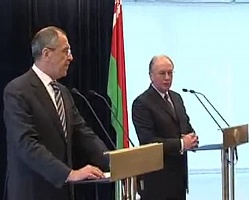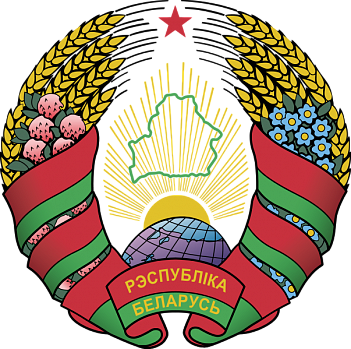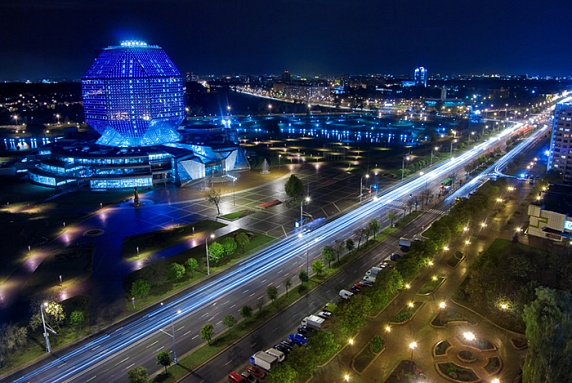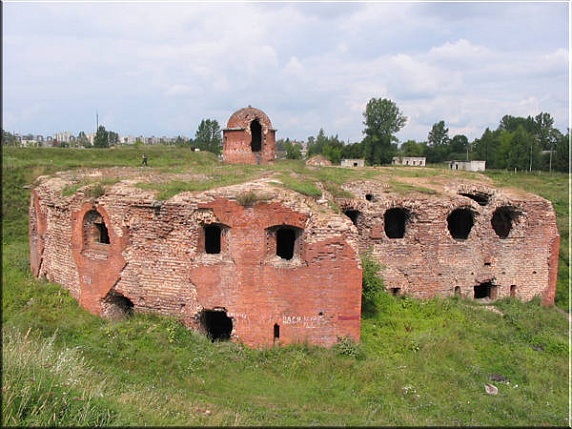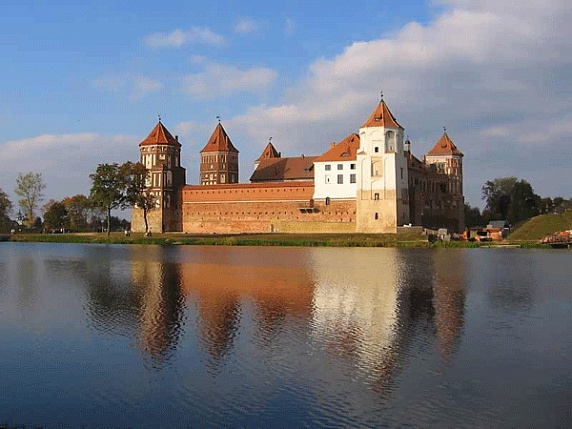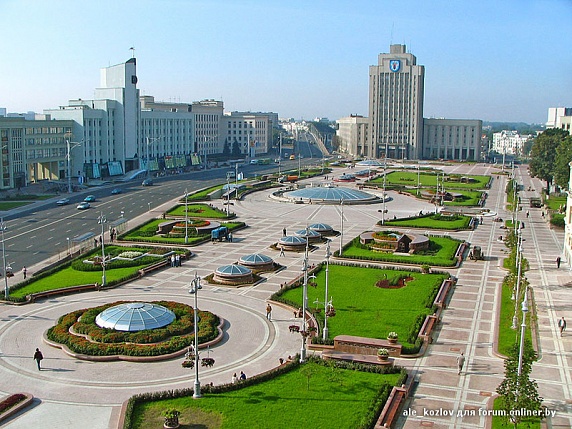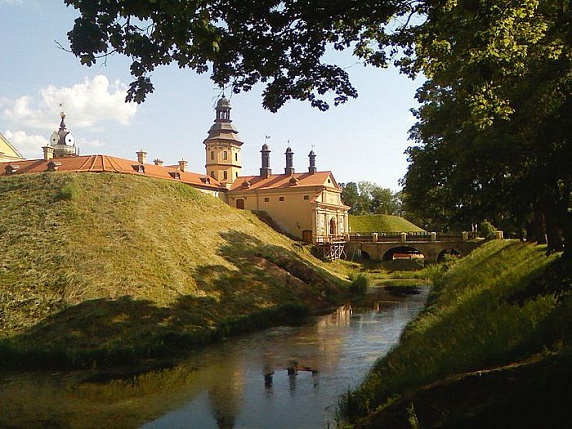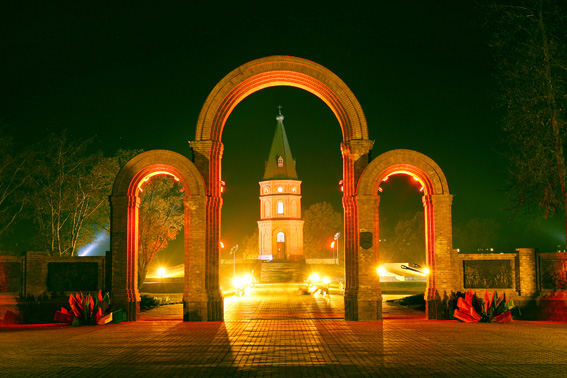 la République du Biélorussie
la République du Biélorussie
Transcript of Remarks and Response to Media Questions by Russian Minister of Foreign Affairs Sergey Lavrov at Joint Press Conference Following Talks with Belarusian Minister of Foreign Affairs Sergei Martynov, Minsk, June 22, 2010
First of all I would like to express appreciation on behalf of our delegation for the hospitality and, as always, excellent organization of work.
We started the program with the laying of flowers at the Victory Monument. A big program is organized in Brest to mark the anniversary of the start of the Great Patriotic War.
We discussed our tasks related to ensuring that the lessons of that war are never forgotten, that the history of that war is never rewritten, and that the memory of this war, the most terrible of those that mankind has gone through always remains with people, with the peoples of Russia, Belarus, Europe and other countries who fought on the World War II battlefields.
We discussed in detail the implementation of the program of joint action in foreign policy approved by the Supreme State Council of Russia and Belarus. It is being implemented not only in full, but even with over-fulfillment of the plan, because additional topics continuously arise that on top of the planned activities require our close consultations. Today we have identified a whole array of such contacts on issues requiring a sufficiently expeditious consideration and approval.
We noted the high level of coordination of our work in the international arena, especially in international organizations: UN, OSCE, EurAsEC, CSTO, and, of course, the CIS. More specifically, I mean the entities which the Republic of Belarus is now joining with our active backing. Minister Martynov has mentioned the Shanghai Cooperation Organization. There is also the Council of the Baltic Sea States. We actively support Belarus' accession to this entity. There is the Northern Dimension project, in which the EU and countries which are not part of it, like Russia, Norway and Iceland, cooperate. We support Belarus' interest in collaborative participation in this format.
We exchanged views on how each of our countries builds relations with the EU. We presume that the policies of Minsk and Moscow toward the EU should be harmonized. It is in our common interest, taking into account the formation of the Customs Union by us together with Kazakhstan – processes certainly not easy. They involve the solution of very specific issues that affect the economic condition of our states and the daily life of our citizens. I state today the reciprocal desire to address these issues on a mutually acceptable and mutually beneficial basis.
As Minister Martynov said, this year we will hold another joint meeting of the collegiums of the Foreign Ministries of the two countries, which will take place in Minsk tentatively in November. In the near future we will fix specific dates and discuss the challenges ahead, including in the context of the integration processes in the CIS space, in the European area, as well as with regard for the ongoing discussion on the problems of European architecture.
We are grateful to the Republic of Belarus for its consistent support of the initiative of President of the Russian Federation Dmitry Medvedev to craft a European Security Treaty. Today we exchanged views on how to further promote this work based on the discussions already held. We are ready to report to our leaders. Today we told the President of the Republic of Belarus, Alexander Lukashenko, about this work. He reiterated his commitment to continue joint coordinated foreign policy efforts.
Question: Did you know in advance or guess the contents of the upcoming statement of Lukashenko concerning the start of a gas war with Russia. Don't you regret that the issue of gas was not included in the agenda of the talks?
Lavrov: For my part, I would like to confirm that the visit was planned long ago, talks of foreign ministers do not cover economic issues; we have other problems. As for presidents, they are responsible for all aspects of interaction with other countries, and of course, entitled to pronounce on any issue. In our case, I repeat, we are guided by a very simple rule: there is a document adopted for joint action – the coordinated action program in foreign policy – and we on both sides – on the Russian side as well as on the Belarusian – are honestly, actively and scrupulously carrying it out. I think that in all other spheres of our cooperation the signed agreed-upon documents should be implemented by relevant agencies and companies as honestly and scrupulously.
Question: Before July 1, when a common customs space will be created, there is very little time left, but some relevant issues for Belarus have not yet been resolved. In this regard, could the foreign affairs agencies of the two countries help to ensure that this process reaches its logical end?
Lavrov: As for the Russian Federation, the MFA is not a lead agency in this process. The lead agencies are cooperating very closely with each other. Not so long ago this topic was discussed in Minsk by visiting Russian First Deputy Prime Minister Igor Shuvalov, who is in charge of these matters. Discussion also took place in contacts between our presidents and heads of government. Such contacts are continuing. Like Minister Martynov, I hope that those responsible for this work will do everything to achieve results on time.
Question: Given the nuances in approach between Russia and Belarus to the situation in Kyrgyzstan, more precisely to Mr. Bakiyev, who has received political asylum in Minsk, what concrete joint efforts can your countries undertake to stabilize the situation in Kyrgyzstan?
Lavrov: In addition to the words of Minister Martynov, I can say that nuances are lacking in our positions on the substance of the problem that has arisen in Kyrgyzstan. There is the humanitarian aspect, which does not apply to the essence of the problem. And the essence of the problem lies in the fact that the Kyrgyz authorities must stabilize the situation on their own, and that external assistance should be limited to only those forms that suit the Kyrgyz authorities themselves. The topic was discussed not so long ago at the meeting of Secretaries of Security Councils of the CSTO member states, which worked out the measures to provide logistical support to Kyrgyz law enforcement agencies so that they more effectively perform their functions and prevent any fresh outbreak of violence. The meeting also agreed upon a number of other measures aimed at calming down the situation and, above all, working with public opinion and preventing an interethnic conflict in Kyrgyzstan.
In terms of next steps, we are convinced that everything must be done for the Kyrgyz authorities to be able to hold a fair, equitable and transparent referendum, scheduled for June 27. This is an important first step in order to bring the situation back to the legal track, and then based on the outcome of the referendum prepare the elections planned for autumn this year.
Question: Two hours ago, gas consumers in Western Europe, including Poland, became very worried about the transit of gas. Can you reassure people in Western Europe that the gas dispute will not affect the transit of gas?
Lavrov: Turn to the relevant specialized institutions that are concerned with this. On the Russian side all assurances have been given. You probably read the famous Krylov fable about the cobbler and the pieman. Once again I will stress: let everyone do his job.
June 23, 2010
